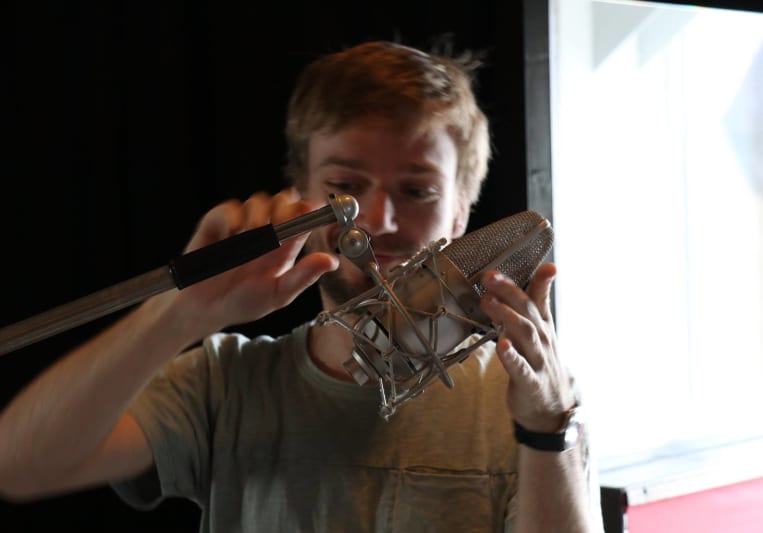
Looking for the analog in the digital age. Both an engineer and a musician with a passion for jazz and world music on one side and the technologic possibilities of this era.
As the digital influence on music has reached it’s peak, musicians and musiclovers nowadays are looking for a healthy balance between acoustical and natural elements and seemingly infinite digital possibilities. Artists today pick up old, vintage gear and those tools are as important in the studio as the almighty computer. From the listener side we see a growth in popularity of vinyl, often used in parallel with streaming services.
With practical experience in different music genres and instruments, a university level engineering degree and more recently a music related technical degree, I understand and can answer to the the challenges artist struggle with.
Three elements often characterise music that inspires me and therefore also my productions:
1. The music reveals a peaceful atmosphere.
2. Acoustic and electronic elements are put together to serve an organic and modern sound
3. Jazz music shines through.
Technical formation:
- Master in electrical engineering (KU Leuven, Belgium, 2014)
- Music production and Sound Engineering (Abbey Road Institute Amsterdam, Netherlands, 2017)
Experience:
- Assistant recording engineer Red Bull Studios Amsterdam
- Freelance recording and mixing
Very good: ProTools, Ableton Live
Intermediate: Logic Pro X
Beginner: Cubase
More info: www.dieterboels.com
Would love to hear from you. Click the contact button above to get in touch.
2 Reviews
 check_circleVerified
check_circleVerifiedDieter has such a great ear. Super easy to work with - a consummate professional.

Dieter is mixing our album as we speak, and I'm very happy about his dedication, musical ideas, communication, resilience and the mixes, of course! Would definitely recommend this guy for your more demanding creative recording and mixing jobs!
Interview with Dieter Boels
Q: Can you share one music production tip?
A: When you arrive at the 'frustration'-step in a production, don't stop, you'll learn the most when you challenge yourself to overcome this step.
Q: What type of music do you usually work on?
A: Alternative jazz, triphop, electronic jazz and world music and related music styles
Q: Tell us about your studio setup.
A: I have a little production studio in Utrecht (close to Amsterdam) and have some nice instruments (Fender Rhodes, Moog Mother, Fender Telecaster). I have a small set of good mics and simple preamps, some famous (MD421, MD441), some less famous (Nohype Ribbon).
Q: What other musicians or music production professionals inspire you?
A: I'm very inspired by artists who achieve a good balance between jazz and electronics, incorporating an organic and familiar sound design. Examples are Hidden Orchestra (Joe Acheson) and Cinematic Orchestra (Jason Swinscoe).
Q: Tell us about a project you worked on you are especially proud of and why. What was your role?
A: I recorded, mixed and mastered an album for a band playing '20s dixieland jazz. The band had been playing together since 45 years and this was their final record. They asked us to get a vintage vibe with a modern touch which I think we achieved pretty wel by using a Decca Tree together with an omni U87 for 90% of the sound and added some spot mics for solo's or lead instruments. Not only was this a challenge technically and personally, as the musicians were old, but this was a beautiful project to be part of.
Q: Analog or digital and why?
A: Hybrid, there's so many advantages to both, why not make use of them.
Q: What do you like most about your job?
A: Almost everyone working in the music industry does it out of passion, so I just love to work with people who share that passion for music.
Q: If you were on a desert island and could take just 5 pieces of gear, what would they be?
A: - Instrument: Fender Rhodes - Manley Massive Passive - Neve 1073 - AKG C12 - Coffee machine
Q: What was your career path? How long have you been doing this?
A: I have a university level electrical engineering degree and worked two years in a purely engineering focused field when realising that my passion for music was not being answered in such a job. Following, I did one year intensive course on music production and sound engineering in Amsterdam and started freelancing after that.
Q: Which artist would you like to work with and why?
A: Joe Acheson, to learn from his sounddesign and working process.
Q: What's your strongest skill?
A: Artist often run in circles, I'm able to take strong and important decisions during the mixing and production process to get results and finished tracks.
Q: What do you bring to a song?
A: With my musical background and very broad interest in different music styles, not only limited to Western modern music, I can add very new insights to songs and have a very fresh and understanding view on a track.
Q: What's your typical work process?
A: I mix tracks in the box, when multiple songs have been accepted by the artist I sum on a console or a summing mixer. For composing I have hourlong creative sessions behind my guitar or Rhodes and when I find something interesting enough I record the idea and continu to work on it later.
Q: Describe the most common type of work you do for your clients.
A: Mixing
Q: What are you working on at the moment?
A: Mixing an album for a alternative jazz band from Amsterdam and mixing an EP for an alternative jazz band from Brussels.

I was the recording and mixing engineer in this production
- Mixing EngineerAverage price - $250 per song
- Recording StudioAverage price - $250 per day
- EditingAverage price - $100 per track
Terms of service are discussed per project.
- BadBadNotGood
- The Cinematic Orchestra
- Bill Evans Trio




